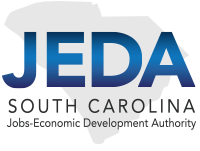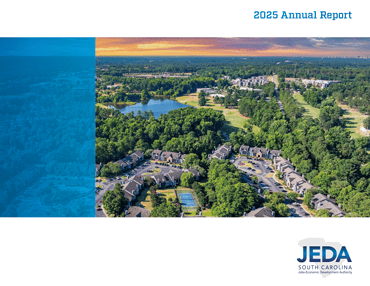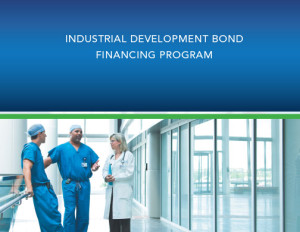JEDA’s Industrial Revenue Bond Program is a tax-exempt bond that allows manufacturing facilities, 501(c)(3) organizations and solid waste disposal facilities access to capital markets to finance their economic development related projects.
Qualifying Enterprises
A large percentage of the applicants to JEDA are industries wanting to establish or expand manufacturing facilities. Industrial Revenue Bonds can be used primarily for acquisition of land, construction of a building and acquisition of equipment. The portion of the project financed with tax-exempt bonds is restricted to the core manufacturing component and certain ancillary facilities. These bonds are most efficient for companies with construction projects in excess of $2 million. The upper limit of a bond issue for a manufacturing enterprise is under $10 million.

Healthcare Facilities
In addition to acute care hospitals, JEDA can issue bonds for other qualifying healthcare providers such as nursing homes, assisted living facilities, facilities providing fitness and wellness programs such as YMCA’s, projects for alcohol and drug abuse commissions and residential treatment programs for youth. These projects are owned by 501(c)(3) organizations.

Educational Facilities
JEDA issues bonds for educational projects owned by 501(c)(3) educational organizations for primary and secondary education. Qualifying enterprises include universities and colleges, as well as charter and private schools located in South Carolina.

Solid Waste Facilities
Companies that dispose of solid waste (which is generally defined as materials that have no value) are eligible to apply to JEDA for access to JEDA bonds. Cement manufacturers, automobile paint shops, as well as traditional landfills can access these types of bonds.
The JEDA Process
| 1. Selection of Bond Counsel & Other Professionals | Applicant selects Bond Counsel from list of approved bond firms and other professionals involved in financing |
| 2. Application | A JEDA application requesting approval of bond issue must be completed by borrower, reviewed by Bond Counsel and filed, along with a $1,000 non-refundable application fee, with the South Carolina Jobs-Economic Development Authority. |
| 3. Inducement Resolution | JEDA will review the application for completeness, and Bond Counsel will prepare an inducement Resolution as an agenda item for JEDA’s next Board of Director’s meeting. The inducement resolution represents preliminary approval only, and is non-binding to all parties. |
| 4. Public Hearing | Federal law requires a public hearing to be held by JEDA for any project prior to final approval; notice is published on the Agency website at least 7 days prior to the hearing, provided to County Council or Municipal Clerk where project is located and published in a paper of general circulation in the county where project is located |
| 5. Negotiate Terms of Bonds | The borrower negotiates with a financial institution for the sale of the bonds via a public sale or private placement. The company may enlist the assistance of an underwriter or placement agent to assist in the sale. Additionally, many local banks may also assist in this process. |
| 6. Finalize Terms of Bond | Bond participants meet, often via a telephone conference call, to finalize bond documents. |
| 7. SC Coordinating Council for Economic Development | Hearing before CCED for approval of bond issue [State Volume cap is approved by SFAA] |
| 8. Adoption of Final Bond Resolution | JEDA adopts the final bond resolution approving the issuance of the bonds. |
| 9. Closing | At closing, bond proceeds are deposited for the benefit of the borrower, for use as permitted in the financing documents. The Issuer fee for JEDA is due at closing. |
| Timetable | Provided all steps proceed smoothly, the entire process from application to delivery of bonds typically requires between 45-90 days |


